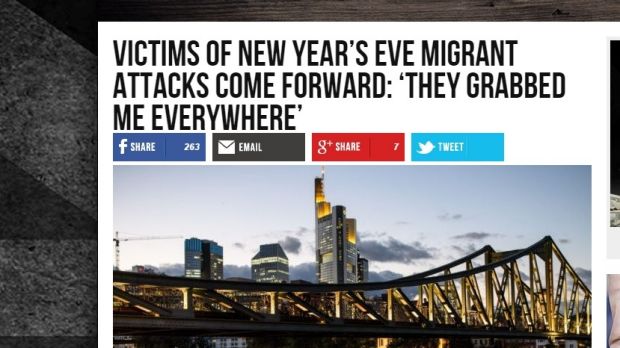A widely-reported, inflammatory news story about a "rioting sex mob" of immigrants assaulting women on New Year's Eve in Frankfurt, Germany, has been exposed as "baseless" after investigation by police.
In a humiliating backdown, the German newspaper Bild, which originally reported the claims, has apologised for what it said was a "false report", which was based on the now disputed claims of a pub owner and some of their staff.

On February 6, Bild reported claims that women were attacked by a 50-strong group of "Arabic and North African looking men", at the city's Fressgass nightspot. The group were also said to have stolen drinks and clothing, and thrown bottles and fireworks.
The newspaper headlined its story "37 days after New Year's Eve, victims break their silence – sex mob in the Fressgass". Another report put the size of the fictional mob of "mostly drunk refugees" at 900.
The newspaper admitted on Tuesday the claims, and its report, were "in no way confirmed by the police and are completely unreliable".
The retraction comes amid worldwide concern over fake news being used to drive political agendas, particularly on right-wing and nationalist websites.
Sexual assault by migrants is a particularly sensitive subject in Germany, after a spate of violence in Cologne on New Year's Eve 2015/16, in which a group of drunken men of North African origin assaulted and robbed hundreds of women.
German police said they had interrogated staff and patrons at the pub and their statements "created considerable doubt about the portrayal of events" and that the story was "baseless" or "without foundation". One person who had claimed to have witnessed the attacks was not even in Frankfurt on New Year's Eve.
Prosecutors are now investigating two of the people who allegedly fabricated the claims.
Bild wrote: "The Bild editorial team expressly apologises for this non-truthful reporting and the accusations against those concerned.
"This reporting does not correspond in any way to the journalistic standards of Bild."
The newspaper said it would investigate how it came to be published.
Bild editor in chief Julian Reichelt apologised on Twitter and said he would "promptly inform you of the consequences" of the investigation.
The Bild story was followed by other German media and re-reported around the world – including right wing newspapers such as the UK's Daily Express and websites such as Breitbart.
At the time of writing Breitbart had still not taken its original report down, though it did publish a new story saying the pair "may" have made up the attacks.
The Express edited its story, adding police denials and Bild's retraction but retaining the original claims.
Germany has had to deal with a rash of hoax stories targeting refugees and immigrants, with the rise of anti-immigration political party AfD and tensions following 2015's extraordinary migration of almost one million refugees into the country.
The stories circulate on social media and occasionally spill over into mainstream media.
In early 2016 a Berlin teen admitted she had invented a story about being abducted and gang-raped by migrants. The story was widely reported by Russian media and on social networks, even leading to a street demonstration by members of the girl's Russian-speaking community in Berlin.
Russian foreign minister Sergey Lavrov accused German authorities of a cover-up, before the girl withdrew her claims after a medical examination revealed she had not been raped, and police found her phone records put her nowhere near the scene of the alleged crime.
The spate of hoax news led one German woman to establish a list of such spurious claims, which she keeps updated online and on Twitter.
According to @HoaxMap, earlier this week hoax stories have circulated about refugees supposedly interfering with funerals.
However the fake news problem was not isolated to anti-migrant groups: in January last year a volunteer at a refugee centre admitted she had made up the story of a Syrian asylum seeker dying in the cold waiting for help outside a Berlin refugee centre.
